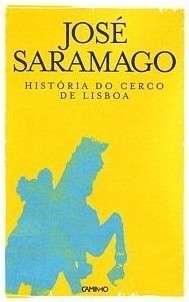The History of the Siege of Lisbon

The History of the Siege of Lisbon (Portuguese: História do Cerco de Lisboa) is a novel by Portuguese author José Saramago, first published in 1989.
It tells the story of a proofreader and the story of the Siege of Lisbon as it both is and is not told in the book he is charged with correcting. It discusses many themes including language, history and historiography, and war in the medieval world.
Plot summary
| Wikiquote has quotations related to: José Saramago |
Raimundo Silva, assigned to correct a book entitled The History of Siege of Lisbon by his publishing house, decides to alter the meaning of a crucial sentence by inserting the word "not" in the text, so that the book now claims that the Crusaders did not come to the aid of the Portuguese king in taking Lisbon from the Moors. This has repercussions both for himself and for the historical profession. The second plot is Saramago's simultaneous recounting of the siege in the style of a historical romance.
Attitude to the Reconquista
Another major theme is Saramago's appreciation of the Reconquista, a central element in the history of Portugal as well as Spain, of which the conquest or re-conquest of Lisbon by Christians and its transformation into the capital of Portugal is a key event.
The protagonist Silva, who can be assumed to at least partially represent Saramago himself in the matter, is very ambiguous in his attitude. On the one hand, he is Portuguese in nationality and - though not very religious - is part of many centuries of Portuguese Christian culture. He is well aware that but for the conquest of Lisbon, Portugal as we know it would never have come into being, and in one passage he states he would not have liked to find himself living "in a city of Moors".
On the other hand, as being a Lisbonian born and bred - and specifically, an inhabitant of Lisbon's Old City, which had been the Moorish city and stood the Christian siege - he is very much in sympathy with the Moorish people of Lisbon, who were attacked by what was for them an alien and cruel conquering army, who starved under the siege and were reduced to eating dogs (a point which is repeatedly referred to in the book) and were subjected to a massacre when the city finally fell.
One way of partially reconciling these two opposing attitudes is having the quite sympathetic Portuguese Christian warrior who takes a prominent part in the book bearing an Arabic name - implying that he was himself of Muslim ancestry, and in general that despite the bloody fighting between Christians and Muslims, there was a certain basic continuity of the people inhabiting the Portuguese territory, whatever their religion.